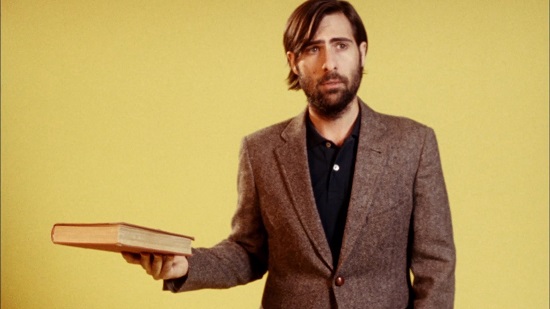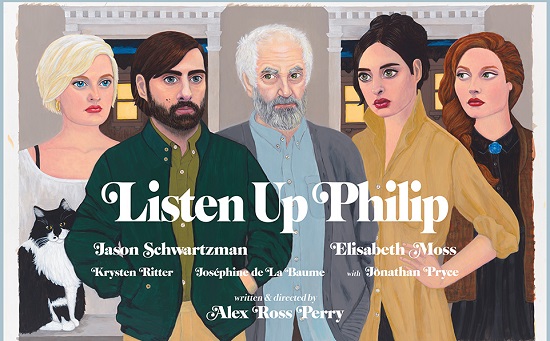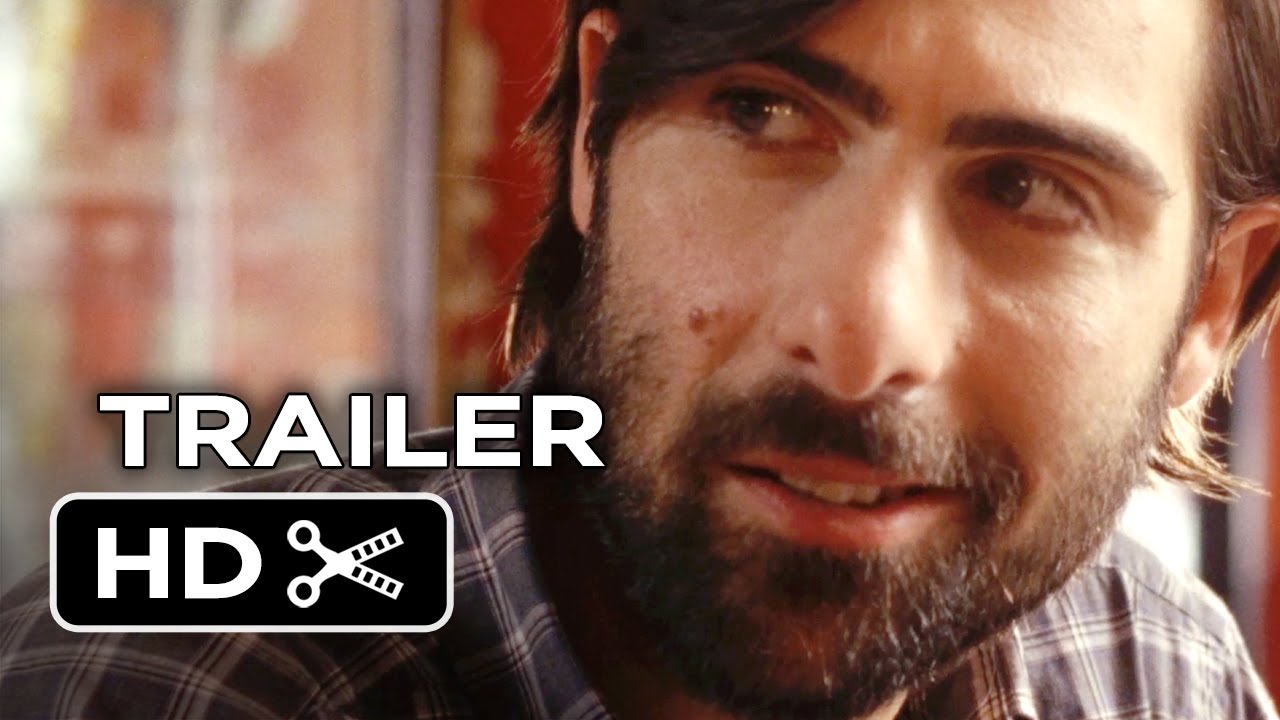One of the best films of 2014, the Coen Brothers’ Inside Llewyn Davis, infuriated some audiences and critics because main character Llewyn refused to find redemption, seek forgiveness or rue his misanthropy. Current discussion around this desire that central cinematic characters acknowledge negative behaviour and atone in some way fills twitter feeds, think pieces and podcasts. One such podcast, hosted by the author Bret Easton Ellis, recently featured Alex Ross Perry, director of Listen Up Philip – one of the best films of 2015, or at least that was released in the UK in 2015. Ellis seems particularly riled by this trend toward forgiveable characters, as he is by a lot of things.
He loves Listen Up Philip though and he’s not alone. The film is a deeply impressive work that is by turns hilarious and scathing, light and literary, bold and vulnerable. Jason Schwartzman is Philip, a writer awaiting the publication of his second novel, and he plays him without an ounce of sentimentality. Elisabeth Moss plays his photographer girlfriend Ashley who somehow finds strength to bounce back from Philip’s almost constant animosity as the film moves from his perspective to hers. The film also spends time with writer Ike Zimmerman (played by Jonathan Pryce) after Philip is invited by his hero to spend time at his upstate home. Zimmerman is proto-Philip and through him Philip’s rage, but also the long-term damage it can cause, takes on greater heft. These diversions from Philip’s story are confidently handled in the script and direction and create ripples of meaning and understanding across time and character.
All this makes it sound heavy going, which it isn’t. It is deeply and starkly funny and humour is an important part of Perry’s work. If you can forgive the director’s refusal to make Philip sympathetic then the film delivers a really good time. It’s knowing and interesting and cinematic. Perry’s cinematic knowledge informs but doesn’t overwhelm his films, from his auspicious lo-fi debut Impolex (2009) and its acerbic monochrome follow-up The Color Wheel (2011). It is most present and mature in Listen Up Philip, which feels as though it is in direct conversation with cinema history. Perry aligns himself with the likes of Hal Ashby, Elaine May, Woody Allen and Wes Anderson and the film marks the arrival of a major and much needed independent voice in American cinema.
Perry is busy juggling the drip-feed release of Listen Up Philip with premiering and distributing his next film Queen Of Earth (2015) which also stars Elisabeth Moss and premiered to acclaim at the Berlinale in February. He is writing a live-action Winnie The Pooh adaptation for Disney and developing an adaptation of Don DeLillo’s The Names, which he intends to direct himself. With Listen Up Philip recently released on Blu-Ray and DVD via Masters Of Cinema, Perry talked about sympathetic characters, the importance of the independent filmmaking tradition and why comedy is so important to drama.
You’ve said that when you were younger you knew you wanted to be an independent filmmaker. What is it about the life of an independent filmmaker that appeals to you?
Alex Ross Perry: I don’t know if I ever understood or fetishized the life per se. I just mean that I was growing up at a time where we had these homegrown type heroes, like Soderbergh and Kevin Smith and Rodriguez, along with your Tarantinos, Wes Andersons and Paul Thomas Andersons. Then I got further into my viewing – Jarmusch and stuff like that. These movies, when I discovered them, felt alive and relevant to me in a contemporary way and the newfound career of being an independent filmmaker seemed viable all of a sudden.
How do you think what you are doing next will impact that view of yourself?
ARP: Well in many ways I have achieved a number of the goals I did set – or would have set had I known more – for myself circa 2000. Like, all I wanted to do was make movies on 16mm like all these heroes, travel to festivals, and so on. So hopefully in some way I am upholding that tradition a little longer and there are people in high school now looking at my films and saying what I said twenty years ago, which is “this seems ideal, I would like to do that”.
What is it like talking about a film in the present tense that was finished so long ago and that you’ve since moved on from? Is that just par for the course for film currently?
ARP: Yes but also it probably always has been. What’s been nice about these last few movies is that the premieres of them are less than ten days from finishing the film, following working on it daily since the shoot, so they come together quickly. Everything else just sort of trickles along for a few years. If I had nothing else to think or talk about I am sure I would find it maddening.
How frustrating is it for the film to do so well at festivals and with critics, and then to take so long to get theatrical release and for that release to be so limited?
ARP: Not being familiar with distribution in the UK, I do not know how limited the release is, but the list of theaters I saw was quite impressive. Any kind of release is a victory and we got plenty of press. A few years ago I would have been bothered by it but now I know it’s all a long game. When my new movie, Queen Of Earth, comes out in the UK, whenever that is, there will be a spike in sales on iTunes or whatever of Listen Up Philip and ideally that pattern continues indefinitely.
In the UK the film seems to have been given a lot of appreciative attention in terms of the way it’s been presented.
ARP: Well to be affiliated with Masters of Cinema, an incredible label keeping home video alive and relevant, is anything but disappointing. So that’s a victory unto itself and I am positive some people will discover the film solely because of its presence as a Masters of Cinema title.
What do you make of the current need that film protagonists be ‘sympathetic’ and can’t be simply interesting, fascinating, realistic etc?

ARP: I do not personally subscribe to it. Of course if you look at the commonly accepted greatest films of all time, and I am talking about say Citizen Kane, Taxi Driver, Clockwork Orange, you see none of this. So yes, it is in fact a very current need. I am sure it will pass soon enough.
The film, like Impolex and The Color Wheel before it, is really funny. How important is it for you to tell dramatic, human stories with humour?
ARP: Ideally when asking the audience to hang out and spend time in a situation or a narrative that is, as you said, angry and unsympathetic, you owe them a bit of comedy, of entertainment, in order to make the experience of sitting through the thing appealing. There has to be some element to grab onto. You have to remember that people want to and deserve to have a good time when watching a movie.
Queen Of Earth doesn’t have the same comedic core though…
ARP: Well it does and it doesn’t. It was meant to come from a different world of cinema, a sort of thriller genre thing, that inherently delivers on a different set of expectations for what is fun or entertaining. But all we talked about when making it was Polanski, and his stuff is blackly hilarious at times, it’s just sort of concealed beneath the craft and baked in the terror of the proceedings. But there are necessary moments of relief that we ended up with just by following the example of somebody like him.
Listen Up Philip looks beautiful and feels deeply cinematic, do you feel you will be able to shoot on film for cinema release for much longer? Are your next career moves ways of staying ahead of that curve and putting yourself in a stronger position to do so?
I certainly hope so. I mean, I guess it could go away overnight without me knowing about it, but I think that as long as icons of popular cinema like Tarantino, Nolan, Paul Thomas Anderson, Wes Anderson, Spielberg, J.J. Abrams, guys like that, continue to shoot on film and more importantly be very vocal about it, the industry will appease them and it can trickle down to me. The trick will be to put myself in a position like those guys are now in a few decades so that I can be one of the people shouting loudly enough about the value of medium and format to make a difference, as those guys have done.
Listen Up Philip is out on DVD and Blu Ray now via Masters Of Cinema



